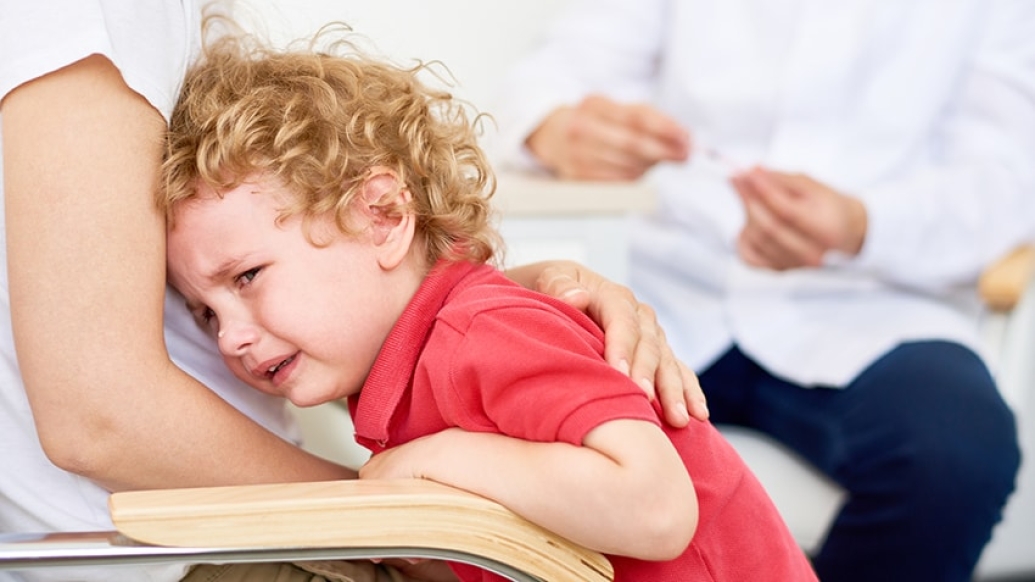A Michigan Medicine pediatrician offers tips to manage anxiety in young patients — and what to do when it’s time for a shot.
7:00 AM
Author |

Children's reactions during routine checkups can vary widely based on age and temperament.
While some little ones remain calm, others are so distressed that efforts to calm them down dominate the visit.
LISTEN UP: Add the new Michigan Medicine News Break to your Alexa-enabled device, or subscribe to our daily audio updates on iTunes, Google Play and Stitcher.
"Toddler-aged children tend to have the most anxiety because they're starting to create certain associations with seeing the doctor but it's still challenging to explain procedures to them," says Shannon Taut, M.D., a pediatrician at University of Michigan's C.S. Mott Children's Hospital.
Fear of the doctor is an issue that resonates with many families, the latest C.S. Mott Children's Hospital National Poll on Children's Health finds.
Half of parents of toddlers and preschoolers say their child is afraid of going to the doctor — mostly because of shots. One in 25 parents had even postponed a vaccine due to their child's anxiety.
The nationally representative survey also found that 1 in 5 parents struggled to concentrate on what the doctor or nurse was saying because their young child was so upset during the appointment.
MORE FROM MICHIGAN: Subscribe to our weekly newsletter
Still, doctor visits are crucial in a child's early years for preventive services and the opportunity for parents and providers to discuss health concerns — even when a young patient resists the notion.
"Soothing a young child's nerves isn't always easy, but there are some strategies that work better than others and can definitely set families up for a successful, productive visit," says Taut, who provides pediatric care at Michigan Medicine's Northville Health Center. "There are also some tactics parents commonly use that can actually make things worse."
Taut offers her top tips for families:
How to make pediatrician visits less scary
1. Prepare them before the visit
Educating children in advance is the most effective way to alleviate fears.
Parents may prompt these conversations with age-appropriate books, a kids' TV show about visiting the doctor or even a toy doctor's kit for a pretend run through.
"The biggest fear is often the fear of the unknown," Taut says. "Anything that makes the interaction feel more familiar is helpful, especially if this exposure comes at home where they're comfortable."
2. Don't create fears or joke about needles
Parents polled said their child's biggest source of fear involved getting a shot (66 percent for children 2 to 3 years old and 89 percent for children ages 4 to 5.) Be cautious, then, about inadvertently promoting needle-phobia.
SEE ALSO: Make Sure Your Teen Has Had These 4 Lifesaving Vaccines
"Parents might say something like, 'Sit still or you may have to get a shot,'" Taut says. "Even if this is done playfully, it creates a negative association."
Emphasize that shots are never a punishment — they help keep people from getting sick.
3. Don't make empty promises
Nearly 1 in 4 parents said they would tell their child there wouldn't be any shots to keep them calm — whether or not an immunization was due.
As a result, "children may leave without the shot they were supposed to have, delaying their vaccine, which is not ideal," Taut says. "Or, parents break a trust with their child, which may only increase nervousness for future visits."
Call the office in advance to know what to expect.
4. Offer distractions
There are no screen time rules when there's a shot involved, Taut says. Letting a child watch favorite videos, listen to music or read a book during the visit can be a helpful distraction for some children.
Asking the patient to cough right before the poke is also a method that works for many patients because it often blunts the pain, Taut says.
5. Be comforting
Holding or hugging a child is preferred over having them restrained, which can only elevate a patient's fears.
SEE ALSO: Your Pediatrician vs. Urgent Care: What to Do When Your Child is Sick
"Comfort positions allow parents to support their children during procedures," Taut says. "This can make children feel safe and decrease anxiety."
A parent's anxiety can exacerbate a child's fear, she adds, so parents should be aware of their own nerves when the needle comes out. (Mott's Poke Program has more ways to help.)
6. Offer a small treat afterward
The promise of an ice-cream cone, small toy or a fun shared outing after the doctor's office may help boost positive associations with the experience.
Says Taut: "Preparing a child for a doctor's visit ahead of time is the most important step in decreasing fears, but it can't hurt to enjoy something fun after it's over."


Explore a variety of healthcare news & stories by visiting the Health Lab home page for more articles.

Department of Communication at Michigan Medicine
Want top health & research news weekly? Sign up for Health Lab’s newsletters today!





